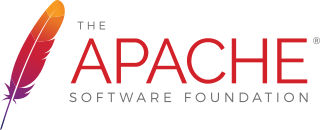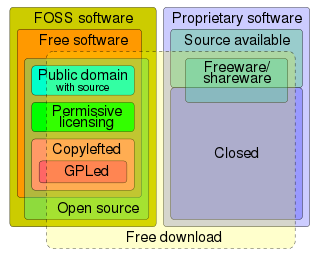
The Apache Software Foundation is an American nonprofit corporation to support a number of open-source software projects. The ASF was formed from a group of developers of the Apache HTTP Server, and incorporated on March 25, 1999. As of 2021, it includes approximately 1000 members.

Free software, libre software, libreware sometimes known as freedom-respecting software is computer software distributed under terms that allow users to run the software for any purpose as well as to study, change, and distribute it and any adapted versions. Free software is a matter of liberty, not price; all users are legally free to do what they want with their copies of a free software regardless of how much is paid to obtain the program. Computer programs are deemed "free" if they give end-users ultimate control over the software and, subsequently, over their devices.
Freeware is software, most often proprietary, that is distributed at no monetary cost to the end user. There is no agreed-upon set of rights, license, or EULA that defines freeware unambiguously; every publisher defines its own rules for the freeware it offers. For instance, modification, redistribution by third parties, and reverse engineering are permitted by some publishers but prohibited by others. Unlike with free and open-source software, which are also often distributed free of charge, the source code for freeware is typically not made available. Freeware may be intended to benefit its producer by, for example, encouraging sales of a more capable version, as in the freemium and shareware business models.

The GNU Lesser General Public License (LGPL) is a free-software license published by the Free Software Foundation (FSF). The license allows developers and companies to use and integrate a software component released under the LGPL into their own software without being required by the terms of a strong copyleft license to release the source code of their own components. However, any developer who modifies an LGPL-covered component is required to make their modified version available under the same LGPL license. For proprietary software, code under the LGPL is usually used in the form of a shared library, so that there is a clear separation between the proprietary and LGPL components. The LGPL is primarily used for software libraries, although it is also used by some stand-alone applications.

Open-source software (OSS) is computer software that is released under a license in which the copyright holder grants users the rights to use, study, change, and distribute the software and its source code to anyone and for any purpose. Open-source software may be developed in a collaborative, public manner. Open-source software is a prominent example of open collaboration, meaning any capable user is able to participate online in development, making the number of possible contributors indefinite. The ability to examine the code facilitates public trust in the software.
Application software is any computer program that is intended for end-user use – not operating, administering or programming the computer. An application is any program that can be categorized as application software. Common types of applications include word processor, media player and accounting software.

A software license is a legal instrument governing the use or redistribution of software.
MOC, MoC, or moc may refer to:
FlexNet Publisher is a software license manager from Flexera Software which implements license management and is intended to be used in corporate environments to provide floating licenses to multiple end users of computer software.
Multi-licensing is the practice of distributing software under two or more different sets of terms and conditions. This may mean multiple different software licenses or sets of licenses. Prefixes may be used to indicate the number of licenses used, e.g. dual-licensed for software licensed under two different licenses.

WJFB is a television station licensed to Lebanon, Tennessee, United States, broadcasting the classic television network MeTV to the Nashville area. Owned and operated by Weigel Broadcasting, the station maintains transmitter facilities in Whites Creek, Tennessee, just off I-24 and Old Hickory Boulevard.
Open iT, Inc. is an independent software vendor that specializes in metering, analyzing, and optimizing usage of critical IT assets. It was founded in 1999 by Eistein Fosli, who obtained his Master of Science in Information Technology from the University of Oslo.

The Ministry of Aviation was a government department during the period of Nazi Germany (1933–45). It is also the original name of the Detlev-Rohwedder-Haus building on the Wilhelmstrasse in central Berlin, Germany, which today houses the German Finance Ministry.
Proprietary software is software that grants its creator, publisher, or other rightsholder or rightsholder partner a legal monopoly by modern copyright and intellectual property law to exclude the recipient from freely sharing the software or modifying it, and—in some cases, as is the case with some patent-encumbered and EULA-bound software—from making use of the software on their own, thereby restricting their freedoms.

The GNU General Public Licenses are a series of widely used free software licenses, or copyleft licenses, that guarantee end users the freedoms to run, study, share, and/or modify the software. The GPL was the first copyleft license available for general use. It was originally written by Richard Stallman, the founder of the Free Software Foundation (FSF), for the GNU Project. The license grants the recipients of a computer program the rights of the Free Software Definition. The licenses in the GPL series are all copyleft licenses, which means that any derivative work must be distributed under the same or equivalent license terms. It is more restrictive than the Lesser General Public License, and even further distinct from the more widely-used permissive software licenses such as BSD, MIT, and Apache.

The GNU Free Documentation License is a copyleft license for free documentation, designed by the Free Software Foundation (FSF) for the GNU Project. It is similar to the GNU General Public License, giving readers the rights to copy, redistribute, and modify a work and requires all copies and derivatives to be available under the same license. Copies may also be sold commercially, but, if produced in larger quantities, the original document or source code must be made available to the work's recipient.
The German Air Ministry had a system for aircraft designation which was an attempt by the aviation authorities of the Third Reich to standardize and produce an identifier for each airframe type produced in Germany. It was in use from 1933 to 1945 though many pre-1933 aircraft were included and the system had changes over those years. As well as aircraft of the Luftwaffe, it covered civilian airliners and sport planes, due to the RLM handing all aviation-related matters in the Third Reich, both civilian and military in nature.

Software categories are groups of software. They allow software to be understood in terms of those categories, instead of the particularities of each package. Different classification schemes consider different aspects of software.
Asigra Inc. is a company that produces a cloud backup and recovery software platform known as Asigra Cloud Backup. The company is privately held and is headquartered in Toronto, Canada.
The Reprise License Manager (RLM) is the software licensing toolkit developed and marketed by Reprise Software, providing on-premises and cloud-based license management, license enforcement and product activation solutions for publishers of commercial software applications. The Reprise License Manager is used by over 800 Independent Software Vendors:









